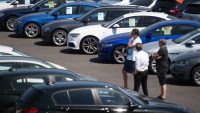 CAR manufacturers are manipulating standard EU fuel efficiency tests in order to inflate the recorded efficiency, it has been suggested.
CAR manufacturers are manipulating standard EU fuel efficiency tests in order to inflate the recorded efficiency, it has been suggested.
A report by the Transport and Environment campaign group outlines a number of ways in which manufacturers supposedly ‘cheat’ the system – making small, but legal, modifications to the cars on test in order to manipulate their recorded fuel economy.
‘Testing and checks on production vehicles are inconsistent and inadequate,’ the report alleges, ‘with manufacturers paying the organisations undertaking and certifying the tests.
‘There is no evidence that carmakers are breaking any formal rules – but they don’t need to – the current test procedures are so lax there is ample opportunity to massage the test results.’
Taping over cracks in body panels to artificially reduce drag, using special lubricants for the car’s parts and even testing the vehicles at altitude (where turbocharged vehicles can generate more power) are mooted to be just a few of the ways to cheat the system.
Disconnecting the alternator to prevent the battery from charging (thus reducing load on the engine) is also said to be one of the tricks used, along with over-inflating the tyres and altering the wheel alignment to reduce rolling resistance.
Greg Archer, clean vehicles manager at the campaign group, accused manufacturers of deliberately manipulating EU tests using the tweaks.
‘This new evidence shows that carmakers in Europe are cheating their own customers by manipulating official tests, which leads to thousands of euros of additional fuel costs for drivers,’ he said.
‘They are also cheating legislators, as EU laws intended to reduce CO2 emissions from cars and vans are only being met in the laboratory, not on the road. The only way to rebuild this trust is by closing loopholes in the current test procedures, to ensure that cheaters never prosper.’
The report comes just hours after the announcement by the SMMT that new cars have improved in efficiency by as much as 25 per cent since 2000.
In a statement commenting on the report, the SMMT said that it supported moves towards new testing procedures, and will be ‘contributing to the development of a new test cycle designed to better represent real-world driving.’






























